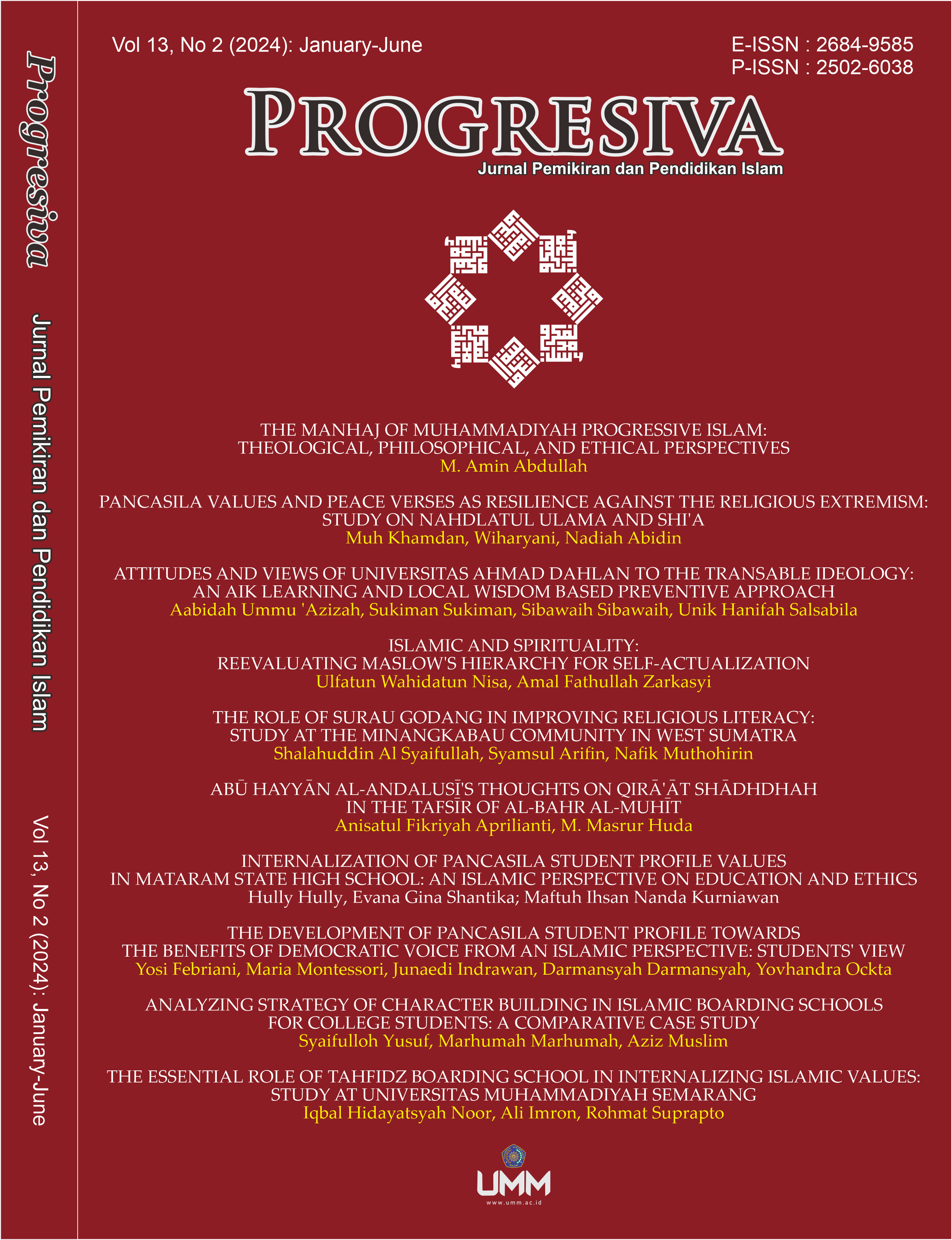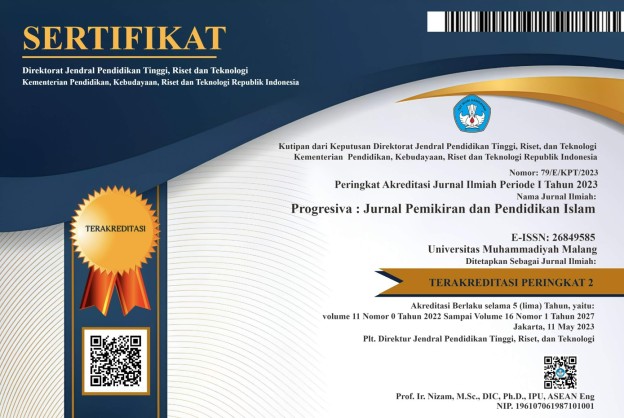Islamic and Spirituality: Reevaluating Maslow’s Hierarchy for Self-Actualization
DOI:
https://doi.org/10.22219/progresiva.v13i02.32486Keywords:
Hierarchy of Needs, Self-Actualization, Maqashid SyariahAbstract
This article explores the Maslow’s Hierarchy of Needs – Self Actualization
also study aims to examine the thoughts brought by Western figures related to Hierarchy of Needs Abraham Maslow in Islamic Perspective which the most idea comes from Al Ghazali’s tought. The hierarchy of needs consisting with five elements, there are: First, physiological needs are the most basic needs in Abraham Maslow's hierarchy. Second, the need for security, Third, social needs occupy Fourth, the need for gratitude Fifth, self-actualization needs are the highest ranked needs in Abraham Maslow's hierarchy. Maslow describes self-actualization by providing emphasis on full-humanness, arising from the development of human biological nature, and in accordance with their birth destiny. The conclusion that we can write here is The Islamic ontological perspective is not incorporated in Maslow’s hierarchy of needs. In addition to the alleged ethnocentrism, non-universality and invalidity, the following mindsets distinguish Maslow’s theory from an Islamic point of view: (a) materialistic-based, (b) the absence of spiritual aspect and different interconnectedness between material and spiritual needs, and world-orientation, disregarding the hereafter.But, Islam can elaborate Maqasid al-Syari’ah (the objectives of Islamic law), human needs are grouped into three descending categories of significance: dharuriyyat (essential), hajiyyat (complementary), tahsiniyyat (embellishment). Dharuriyyat is the must-exist necessities that if not fulfilled will result in an imperfect human life as well as threaten the safety of humanity both in this world and the hereafter. This is inherent in the preservation of religion, life, intellect, progeny, and wealth. Hajiyyat is the complementary needs to remove hardships that are contained in the process of satisfying the necessities. Tahsiniyyat refers to things that embellish people’s lives by adding quality to the necessities.
Downloads
References
Abdurrahman, Z. (2020). TEORI MAQASID AL-SYATIBI DAN KAITANNYA DENGAN KEBUTUHAN DASAR MANUSIA MENURUT ABRAHAM MASLOW. Jurnal Ushuluddin: Media Dialog Pemikiran Islam, 22(1). Https://Doi.Org/10.24252/Jumdpi.V22i1.15534
‘Adziima, M. F. (2022). Psikologi Humanistik Abraham Maslow. Jurnal Tana Mana, 2(2), 86–93. Https://Doi.Org/10.33648/Jtm.V2i2.171
Al Ghazali. (N.D.-A). Ihya Ulumuddin.
Al Ghazali. (N.D.-B). Minhajul Abidin.
Arquisola, M. J., & Walid Ahlisa, S. U. (2019). Do Learning And Development Interventions Motivate Employees At PT Danone Indonesia? Applying Mcclelland’s Theory Of Motivation To FMCG Industries. FIRM Journal Of Management Studies, 4(2), 160. Https://Doi.Org/10.33021/Firm.V4i2.780
Arroisi, J., & Badi’, S. (2022). Konsep Harga Diri: Studi Komparasi Perspektif Psikologi Modern Dan Islam. Psikologika: Jurnal Pemikiran Dan Penelitian Psikologi, 27(1), 89–106. Https://Doi.Org/10.20885/Psikologika.Vol27.Iss1.Art7
Bari, A., & Hidayat, R. (2022). TEORI HIRARKI KEBUTUHAN MASLOW TERHADAP KEPUTUSAN PEMBELIAN MEREK GADGET. MOTIVASI, 7(1), 8. Https://Doi.Org/10.32502/Mti.V7i1.4303
Bornstein, M. H. (2018). The SAGE Encyclopedia Of Lifespan Human Development. SAGE Publications, Inc. Https://Doi.Org/10.4135/9781506307633
Ghazzālī, & Field, C. (1991). The Alchemy Of Happiness. M.E. Sharpe.
Hendro Setiawan. (2014). Manusia Utuh, Sebuah Kajian Ats Pemikiran Abraham Maslow. PT Kanisius.
Jarvis, M. (2000). Theoretical Approaches In Psychology. Routledge.
Majid, N. (Ed.). (2002). Manusia Modern Mendamba Allah: Renungan Tasawuf Positif (Cet. 1.). Diterbitkan Atas Kerjasama Penerbit Iiman Dengan Penerbit Hikmah.
Marhani. (2018). Aktualisasi Tasawufal Ghazali Dalam Mengantisipasi Krisis Spiritual. 1–24. Http://Dx.Doi.Org/10.33477/Fkt.V9i1.674
Maslow, A. H. (1970). Motivation And Personality (2d Ed). Harper & Row.
Maslow, A. H. (1992). The Power Of Self-Actualization.
Maslow, A. H. (1993). The Farther Reaches Of Human Nature. Arkana.
Maslow, A. H. (1999). Toward A Psychology Of Being (3rd Ed). J. Wiley & Sons.
Maslow, A. H. (2013). A Theory Of Human Motivation. Martino Publishing.
Maslow, A. H., Lowry, R., Maslow, B. G., & Freedman, J. L. (1982). The Journals Of Abraham Maslow. Lewis Pub. Co.
Muazaroh, S., & Subaidi, S. (2019). KEBUTUHAN MANUSIA DALAM PEMIKIRAN ABRAHAM MASLOW (TINJAUAN MAQASID SYARIAH). Al-Mazaahib: Jurnal Perbandingan Hukum, 7(1), 17. Https://Doi.Org/10.14421/Al-Mazaahib.V7i1.1877
Pratama, F. A., & Sumantri, S. (2022). [No Title Found]. Aqlania, 13(1), 1. Https://Doi.Org/10.32678/Aqlania.V13i1.5719
Rotter, J. B., Chance, J. E., & Phares, E. J. (1972). Applications Of A Social Learning Theory Of Personality. Holt, Rinehart And Winston.
Ryandi, R. (2016). Pengalaman Spiritual Menurut Psikologi Transpersonal (Kajian Kritis Ilmu Tasawuf). KALIMAH, 14(2), 139. Https://Doi.Org/10.21111/Klm.V14i2.609
Saybrook Graduate School And Research Center, & Friedman, H. (2002). Transpersonal Psychology As A Scientific Field. International Journal Of Transpersonal Studies, 21(1), 175–187. Https://Doi.Org/10.24972/Ijts.2002.21.1.175
Wahba, M. A., & Bridwell, L. G. (1976). Maslow Reconsidered: A Review Of Research On The Need Hierarchy Theory. Organizational Behavior And Human Performance, 15(2), 212–240. Https://Doi.Org/10.1016/0030-5073(76)90038-6
Westwood, R. I. (1992). Organisational Behaviour: Southeast Asian Perspectives. Longman Group (Far East) Ltd.
Yahya, N., S.H.S, O., Al-Shafi’I, M. M. O., Abdullah, M. S., Ali, M. S., & Zin, E. I. E. W. (2018). The Concept Of Human Will According To Al-Ghazali And Abraham Maslow: A Comparative Study. International Journal Of Academic Research In Business And Social Sciences, 8(10), Pages 91-99. Https://Doi.Org/10.6007/IJARBSS/V8-I10/4715
Downloads
Published
How to Cite
Issue
Section
License
Copyright (c) 2024 Ulfatun Wahidatun Nisa, Amal Fathullah Zarkasyi

This work is licensed under a Creative Commons Attribution-ShareAlike 4.0 International License.


















